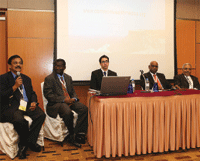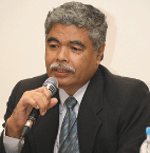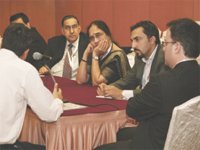 ‘eHealth Asia 2008’ – the second annual Asian conference presented by eHEALTH magazine was recently concluded in the Malaysian capital city of Kuala Lumpur. Held between 11-13 November 2008, at the magnificent Kuala Lumpur Convention Centre, the event marked the second consecutive year of successful organisation of the event.
‘eHealth Asia 2008’ – the second annual Asian conference presented by eHEALTH magazine was recently concluded in the Malaysian capital city of Kuala Lumpur. Held between 11-13 November 2008, at the magnificent Kuala Lumpur Convention Centre, the event marked the second consecutive year of successful organisation of the event.
eHealth Asia 2008 attributes its success to the enduring partnership and active support by a number of national and international agencies from across government, academia, industry and development organisations. Of special mention is the support from Ministry of Health Malaysia, Commonwealth Secretariat, Commonwealth Medical Association, Malaysian Medical Association, Indian Association of Medical Informatics, Malaysian Health Informatics Association and Open Source Healthcare Alliance whose invaluable contribution through provision of expert speakers, resource persons and eminent delegates is sincerely appreciated.

 Panel Discussion by Commomwealth Medical Association. L to R: Dr. N. Arumugam, VP-MMA, Malaysia; Dr. Oheneba, Secretary-CMA, Ghana; Dr. J P Tabone, VP-CMA, Malta;
Panel Discussion by Commomwealth Medical Association. L to R: Dr. N. Arumugam, VP-MMA, Malaysia; Dr. Oheneba, Secretary-CMA, Ghana; Dr. J P Tabone, VP-CMA, Malta;
Dr. S. Arulrhaj, President-CMA, India; Dr. M. Abbas, President-IMA, India
The inspiring opening keynote speech of Dato’ Sri Dr. Hj. Mohd Nasir b. Mohd Ashraf, Secretary General, Ministry of Health, Malaysia (represented by Dr. Maimunah Abdul Hamid, Ministry of Health, Malaysia) set the right tone for the two days of conferencing. In context of the challenges in public healthcare delivery, Dato’ Mohd. Nasir’s speech underlined the need for eHealth adoption in countries like Malaysia and the commitment shown by the national government in making such initiatives succeed. While acknowledging the substantial progress that has been made in this direction, the speech asserts the need for further investments and a continued support from public health professionals to achieve the full potential of a connected healthcare environment in the country.


Jack Tan
IT-Head, Pantai Medical Centre,
Malaysia
 Karl Brown
Karl Brown
Associate Director
(Applied Technology),
Rockefeller Foundation, USA
 Dr. Hammad Durrani
Dr. Hammad Durrani
Dept. of
Community
Health Sciences,
Aga Khan
University, Pakistan

Datin’ Dr. S. Selvaraju
Consultant, Planning & Development Division,
Ministry of Health, Malaysia

Dr. Rosnah Hardis
Director-Health Services,
Ministry of Health, Malaysia
 Dr. Abdullah Salleh
Dr. Abdullah Salleh
Sr. Consultant Surgeon &
Clinical IT
Coordinator, Hospital Selayang, Malaysia
The first technical session of the conference titled ‘Understanding eHealth Policy, Technology, Strategy’ carried an impressive panel of speakers, comprising – Dato’ Dr. Jai Mohan, Professor of Health Informatics & Pediatrics, IMU Malaysia & VP, Malaysian Health Informatics Association; Dr. Molly Cheah, President, Open Source HealthCare Alliance, Malaysia; and Datin’ Dr. S. Selvaraju, Consultant, Planning & Development Division, Ministry of Health Malaysia. While Dato’ Dr. Jai Mohan presented on the potential of eHealth applications in maximising healthcare access, Dr. Molly Cheah talked about the application of open standards based healthcare solutions and Datin’ Dr. Selvaraju contributed on the best practices and challenges in developing national health information network. The common over-arching theme of all these presentations was clearly pointing towards the technological and functional means for adopting networked healthcare delivery systems. Dr. Jai Mohan predicted that web and convergence technologies will revolutionise healthcare in the near future by facilitating the emergence of Health 2.0. In such an environment patients, providers and payers will connect seamlessly and care provisioning will substantially improve. Dr. Cheah was optimistic that open standards based health IT solutions will make technology adoption in public health affordable and easy. Referring to current challenges of incompatibility and non-interoperability among disparate vendor platforms, Dr. Cheah showcased possibilities of open source solutions in developing a more equitable health network. Illustrating the blue print for a National Health Information Network (NHIN), Dr. Selvaraju voiced her concerns to overcome the current challenges in policy, regulatory, technology, and above all, attitudinal aspect of healthcare professionals.
The second technical session titled ‘Technology Solutions & Best Practices for ICT driven Healthcare’ started off with a captivating presentation by Prof. Dr. Stephen Chu, Vice Chair, Health Level 7 (HL7) New Zealand & Head-Health Informatics, Metamorphous Consulting. Delivering his presentation on importance of standards in eHealth interoperability, Dr. Chu effectively brought out the critical aspects and differences in technical and semantic interoperability issues, the challenges involved in implementing them and their implications on healthcare delivery and outcome. The second presentation by Dr. Amiruddin Hisan, Dy. Director (TeleHealth Division), Ministry of Health, Malaysia was another interesting deliberation focusing on telehealth initiatives undertaken by the Malaysian government. Speaking on the Tele-Primary Care (TPC) initiative Dr. Hisan appreciated the proactive role of the government in supporting the program and lauded the role of doctors and health professionals who took special interest during its development and implementation. The final presentation of the session by Ashok Chandavarkar, APAC Healthcare Programs Manager, Intel, provided an insight into the cutting-edge technology solutions for mobility in healthcare and its immense potential in transforming care delivery process. Underlining the advantage for hospitals to go mobile at the point-of-care, Mr. Chandavarkar showcased Intel’s latest innovation product, the ‘Mobile Clinical Assistant’ (MCA) launched early last year.
 The Commonwealth Medical Association’s panel discussion on ‘Global Experiences in eHealth Implementation & Practices’ put up some interesting presentations and engaging discussions in the afternoon session. Chaired by Dr. S. Arulrhaj, President, Commonwealth Medical Association and co-Chaired by Dr. M. Abbas, President, Indian Medical Association, the panel comprised of Dr. Oheneba, Secretary-CMA, Ghana; Dr. N. Arumugam, VP, Malaysian Medical Association and Dr. JP Tabone, VP, Medical Association of Malta. With experience sharing on eHealth initiatives from such diverse geographies across the world, the session proved to be highly informative and enlightening.
The Commonwealth Medical Association’s panel discussion on ‘Global Experiences in eHealth Implementation & Practices’ put up some interesting presentations and engaging discussions in the afternoon session. Chaired by Dr. S. Arulrhaj, President, Commonwealth Medical Association and co-Chaired by Dr. M. Abbas, President, Indian Medical Association, the panel comprised of Dr. Oheneba, Secretary-CMA, Ghana; Dr. N. Arumugam, VP, Malaysian Medical Association and Dr. JP Tabone, VP, Medical Association of Malta. With experience sharing on eHealth initiatives from such diverse geographies across the world, the session proved to be highly informative and enlightening.
The day concluded over a special workshop by Microsoft, titled – ‘Knowledge Driven Health’. The session showcased some of the innovative solutions that Microsoft has to offer for the healthcare industry. Beginning with the introductory speech by Azizah Ali, General Manager-Public Sector, Microsoft Malaysia, the technical presentations were delivered by Werner Van Huffel, Technology Strategist – Health and Social Services, Microsoft Asia Pacific Region. The presentation by Mr. Huffel focused on two significant aspect of health IT ‘patient relationship using CRM solutions’ and ‘business intelligence and healthcare analytics’. The final presentation by Alex Chang, Managing Director, Gloco Holdings, Malaysia, showcased how CRM and BI solutions are bringing higher efficiency and business benefits for healthcare organisations.
An exciting panel discussion kicked-off the second and final day of the conference. Moderated by Dr. Rosnah Hardis, Director – Health Services, Ministry of Health, Malaysia, the panel comprised of Dr. Abdullah Salleh, Sr. Consultant Surgeon & Clinical-IT Coordinator, Hospital Selayang, Malaysia; Tan Hai-Shi, IT Manager, Gleneagles Intan Medical Centre, Malaysia; Jack Tan, IT Head, Pantai Medical Centre, Malaysia; Dr. K Tilak, Chief Medical Officer – Asia, iSoft; and Werner Van Huffel, Technology Strategist – Health and Social Services, Microsoft Asia Pacific Region. Focusing on the theme – ‘simplifying technology challenges of healthcare enterprises,’ the panel brought forth some the daunting challenges faced by modern healthcare enterprises. Having a mix of clinicians, hospital IT managers and solution providers on the panel ensured that each of them gets a fair chance to voice their concern, respond and react to a myriad of issues across clinical, administrative and technological aspects of healthcare delivery, operations and institutional mechanisms.
A set of interesting presentations came up in the following technical session titled – ‘Technology Applications for Efficient Healthcare Management’. Chaired by Dr. Azrin, Ministry of Health, Malaysia, the session had Dr. Hammad Durrani, Department of Community Health Sciences, Aga Khan University, Pakistan; Rajendra Pratap Gupta, President & Director, Disease Management Association of India; and Dr. Ramin Moghaddam, President, Iranian Medical Informatics Association (IrMIA). Dr. Durrani presented on the Panacea project of IDRC that works towards eHealth capacity building and knowledge sharing among developing countries of the world. Mr. Rajendra P Gupta deliberated on the role of telehealth in disease management & chronic care and Dr. Moghaddam brought out the concept of patients roaming profile (PRP) and its utility in sharing health information in the context of medical tourism.
The concluding session of the conference held late afternoon on the final day was a special round-table, titled ‘Way Forward for eHealth – follow up from Rockefeller Foundation’s Bellagio Conference’. Chaired by Karl Brown, Associate Director (Applied Technology), Rockefeller Foundation, USA, the panel included Dr. Molly Cheah, President, Open Source HealthCare Alliance, Malaysia; Dr. Hammad Durrani, Dept of Community, Health Sciences, Aga Khan University, Pakistan; and Dr. Ravi Gupta, Editor-in-Chief, eHEALTH magazine. The session started with an overview presentation on Bellagio initiative and the action points identified thereafter. Following this, an intensely engaging open floor discussion was initiated along key issues of policy, technology, access, capacity building and funding mechanisms for eHealth adoption in developing countries.
The conference concluded on a high note. It proved to be an excellent opportunity for participants to network, partner and mutually share knowledge and expertise towards building better strategies for making eHealth a success in the near future. 
Be a part of Elets Collaborative Initiatives. Join Us for Upcoming Events and explore business opportunities. Like us on Facebook , connect with us on LinkedIn and follow us on Twitter , Instagram.


